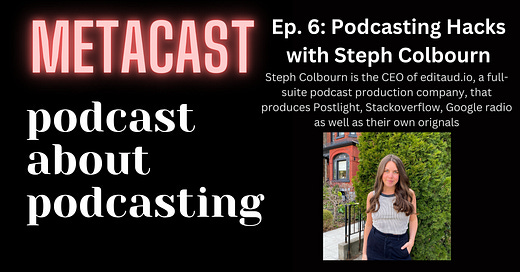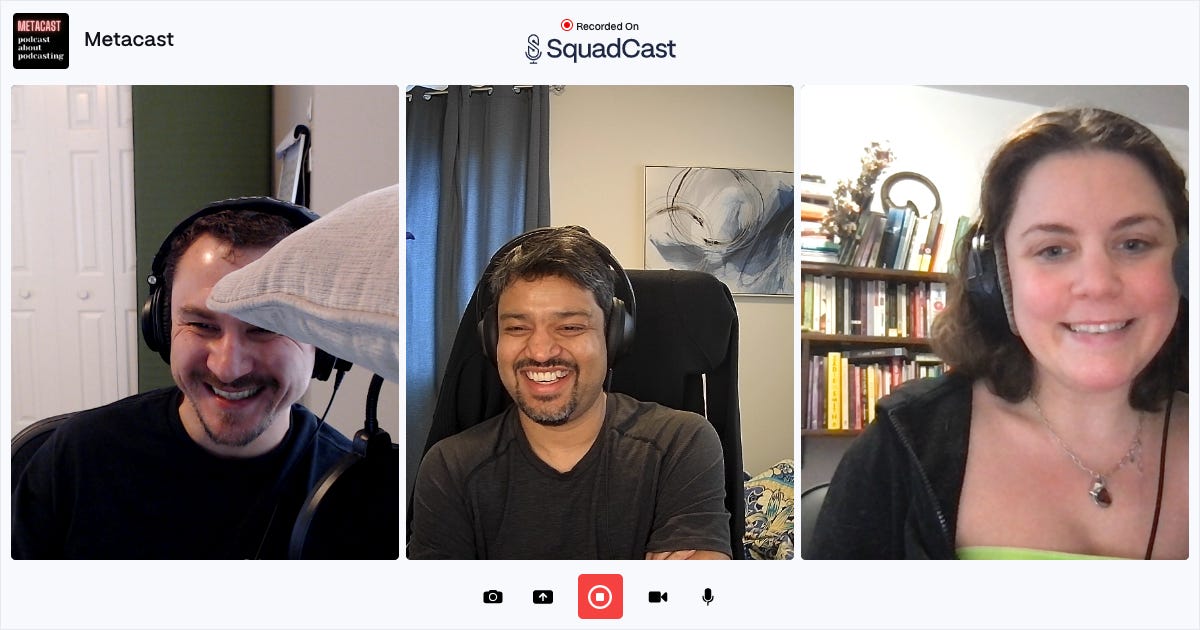This week we interviewed Steph Colbourn, the CEO of editaud.io, a full-suite podcast production company that produces one of our favorite shows about business and technology — The Postlight Podcast. They also produce The Stack Overflow Podcast, radio shows for Google, and a few other podcasts enjoyed by people all over the world, including their own originals!
We heard Steph talk on Postlight’s Ep. 300: How it’s made and wanted to talk to her ever since! And so we did…
👉 Listen to Metacast: Apple, Spotify, CastBox, Google, YouTube 👈
This episode is full of hacks and insights about podcasts and audio production — just look at the gigantic list of takeaways below!
Some of the highlights for me were:
People use pedals (like the real pedal things under their desks) to transcribe audio
Steph is so proficient with spectrograms she can edit audio without listening to it
This episode turned out quite warm because we also talked about life in Yukon, working as a bartender, and marginalized identities that editaud.io is on a mission to amplify. It was a fun recording, full of laughter and smiles as you can see in the SquadShot (don’t ask me why I forgot to remove the pillow from the mic).
Key takeaways
Audio editing
One hour of audio takes 2.5-3 hours of post-production time.
There’s no right way to edit. Anyone who tells you there is the one way is just being pretentious. People work differently. Find what works for you.
Essentials to get started with editing audio: get a DAW (e.g. Logic, Reaper, etc.) and learn compression, noise gates and EQ.
Build your toolkit. Different use cases need different tools. Try different tools, see what works for you and combine them.
Get a pair of studio headphones, so you can hear nuances in the audio you edit.
Experience matters. Steph can edit an episode by just looking at the spectrogram. Super powers like this come with experience.
Keep your hands in shape with grip strength exercises. Steph recommends using one of those spiky balls.
Find keyboard shortcuts that work for you. Using keyboard shortcuts can really speed your editing up, so experiment with shortcuts in your DAW to optimize your workflow. Also, try “mouse shortcuts,” e.g. Steph set the left mouse click to the scissors tool that allows her to cut audio more efficiently.
Cut less during emotional moments in a podcast. Removing extra filler words might make the person sound like an asshole.
When cutting breaths, leave extra space, so the speech still sounds natural. It’s better to reduce the volume of breaths rather than completely cut them.
Process
Work with a producer/editor who understands what you’re making. It’ll take 5-6 episodes to get on the same page. Ideally, you don’t even need to listen to what you get back from your editor.
When you work as a freelancer, you can scale with contractors. That’s how Steph coped with the increased demand for her services. It eventually enabled her to start a company.
Be creative with technology. If you only have one input in your audio interface but two mics, you can pan one mic to the left and the other to the right. That will allow you to neatly separate them into different tracks in post-production.
If you do a pickup later from a different room, it’ll sound different. But you can use iZotope software to apply the “original” room tone to make it sound as if it was all recorded in one session.
Original podcasts help hone team’s skills. People can do stuff they like and learn while doing it on their own schedule. Steph used this approach during the pandemic when clients were cutting marketing budgets.
The cost range for producing an episode varies from $350 to $15,000. Steph’s company can even do things like scheduling and room setup for you. So it really depends.
Warm up tips from Steph. They ask for name and pronouns twice to get them right. Ask rapid fire questions and then don’t use that in the recording.
Content
Provide context to your listeners. When you mention something on the show that’s related to a previous episode, or something that your guest does, or something you talked to the guest about before you started the recording, your listeners might not have any idea what you’re talking about. Provide them the context to be able to enjoy your episode.
Original shows can add to brand awareness. If your shows are successful, of course.
If in doubt, mark your podcast as “explicit.” We mentioned “suicide” in the show, which makes it explicit.
Meta-advice
You can do anything you put your mind to. Don’t psyche yourself when getting started. Just do it.
Being smart with a URL can backfire. Steph’s company domain is editaud.io and sometimes it’s hard for people to grasp it. A dot.com domain is often the best bet for understandability and recall if you can afford it.
Where to find Steph and editaud.io
Steph on Twitter: @steph_colbourn
Show notes
Software
Anchor.fm — a podcast hosting platform that we use.
iZotope RX — a software suite for fixing issues and improving audio quality.
Descript — a tool that can help you edit audio similar to editing text in a word processor.
Logic Pro — a digital audio workstation (DAW) from Apple.
Amadeus — an audio editing tool that Steph uses for some tweaks.
Pro Tools — another DAW commonly used in the music industry.
Adobe Audition — yet another DAW. Photoshop for audio.
Audacity — a good free DAW for beginners.
Reaper — a great DAW that only costs $60 for a home license.
Descript — a tool that can help you edit audio similar to editing text in a word processor.
Gear
Shure SM7b — a kick ass condenser mic for podcasters and radio hosts. Steph was using it for recording this podcast.
beyerdynamic DT 770 PRO — studio headphones that Steph recommends.
Shure SM58 — an indestructible and fairly cheap dynamic mic that is widely used for live concerts.
Genelec 8330A — high quality (and pricey!) studio monitor speakers.
Services
APM — a service for music licensing.
Soundcloud — a service where you can find and license music.
Air rate guide — rates for services for podcasters.
Podcasts
Well…Adjusting (an editaud.io original)
Postlight: How It’s Made: 300 Episodes of the Postlight Podcast!
Events
Other mentions
Get in touch
We’d love to hear from you! Arnab is a Twitter guy and I’m on Instagram. Use the method that works best for you!
Email: hello@metacastpodcast.com (both of us get it)
Arnab’s Twitter: @or9ob
Ilya’s Instagram: @podcasthacks
You can also leave comments on this substack post. Don’t forget to subscribe if you haven’t already!
Bye for now.








